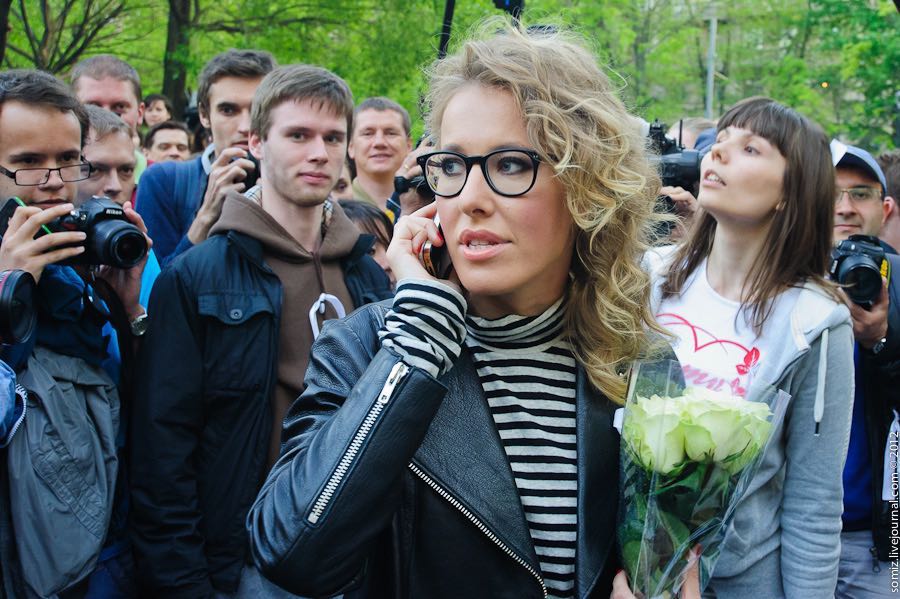Why does the Kremlin allow socialite Ksenia Sobchak to take part in the presidential elections? Distraction? Theatricality? According to security expert Mark Galeotti it reflects the limitations of Putin's hyper-presidential system. 'Vote against all' is a way out for the population.
 Ksenia Sobchak. Photo: Evgeniy Isaev / Flickr (CC BY 2.0)
Ksenia Sobchak. Photo: Evgeniy Isaev / Flickr (CC BY 2.0)
The news that Ksenia Sobchak, part-time opposition gadfly, erstwhile reality TV host, and full-time celebrity, plans to stand in the 2018 presidential elections has – rightly – been interpreted as a Kremlin bid to ‘sex up’ what otherwise seemed unbearably tedious elections and also to split Alexei Navalny’s opposition camp. That Sobchak presented herself as the ‘against everyone’ candidate, simply a depository for disaffection and detachment, seemed to prove that this was just a piece of pre-election theatre. But there is a reason why authoritarian regimes censor the theatre. Even if the outcome of the elections is a foregone conclusion, politics are by no means dead in Russia.
The challenge for the Kremlin’s political technologists is the calibration of participation. Putin’s Russia is neither a Western democracy, nor Stalinism. It is a ramshackle mix of kleptocracy, authoritarianism and, perverse though it may seem to say it, democratic practices. The very reason why elections are held and the level of turnout matters, why over the years the Kremlin has worked to maintain the pretence of party competition, is not to appease the West (we have no trouble dealing with authoritarian China and monarchic and repressive Saudi Arabia), but to appease its own people.
Ksenia Sobchak is not seeking to topple Putin. Indeed, the only way she can get the requisite number of signatures even to be able to stand in the elections is with the government’s open or tacit support. She has talked in vague terms of a comprehensive renewal of every aspect of the country, from its politics to its economy, but even in her own words, by voting for Sobchak, ‘you are not electing her to the presidency. You are using a legal and peaceful opportunity to say Enough!’
Co-opting the masses
Here is the irony. Sobchak, well-known but not especially well-liked according to recent surveys, was presumably picked precisely because she was different and noteworthy enough to generate interest, but not serious enough to be a threat. There have been previous, similar Kremlin projects such as the billionaire Mikhail Prokhorov, but the times are different. Putin never relied on coercion, nor even so much on his narrative of national glory, but rather in co-opting the masses through a steady improvement in their quality of life and the elite through generous opportunities for embezzlement.
The economic downturn has seriously affected the population, and also created new pressures on the elites, with a handful of Putin’s closest being protected at the expense of others. The current flurry of corruption arrests reflects not just a defensive response to Navalny’s trenchant campaign, but also intra-elite struggles over suddenly-scarce resources. The sad truth is that often, when you see an official arrested, the question to ask is not necessarily ‘what did he steal?’ but ‘who wanted what he was stealing?’
Nor is the legitimacy of the regime being bolstered by the new round of imperial adventurism. The war in Syria is not popular, the war in Donbas is not admitted, and the political war with the West is regarded as at best a depressing necessity.
By introducing Sobchak into the presidential race, the Kremlin is admitting it cannot win the argument. With no new narrative, unable to buy or bully support, it has to rely on disruption, preventing the vote from reflecting the true sentiments of the country. Fair enough: the grand distraction is a classic electoral tool. Yet it also reflects the limitations even of this hyper-presidential system. Its attempts to create grass-roots political movements, from the Nashi youth movement to today’s Youth Army have failed to catch on. Governors may be able to control their regions, thanks to the administrative resource at their disposal, but they cannot prevent the rise of regional politics and may even be sucked into them. And meanwhile the elite is divided and uncertain, less enthused by Putin’s focus on his historical legacy and geopolitical ambitions than dismayed by its implications of them.
All these divisions create cracks and contradictions. Ideas, movements and individuals grow and plot in the cracks, from the orthodox-nationalists angered that the Kremlin did not ban the film Matilda to the liberals clustered around Navalny. And the contradictions, not least between the regime’s claims to be defending Russia and the evident truth that they are robbing and mismanaging it, empower them and undermine the state.
Into this charged environment wanders Sobchak, who by her very presence breaks the fourth wall of managed Russian politics, demonstrating its theatricality. It is probably not what she meant. It is certainly not what the Kremlin meant. But while she will not bring Putin down, she is turning an election that was once intended to be a coronation, then became an inconvenient necessity, into a farce. It is fitting that the mistress of so many reality TV shows should be the one to do this.
There is little prospect of any mass risings, not even of a rival presidential candidate winning the day. But as Sobchak has noted, the Russian population does have its own weapon of the weak, the power not to vote. Even if exhorted, cajoled, bribed and threatened, bussed to the polling stations from their offices, factories and barracks, they ultimately can still spoil their ballot, leave it blank – or vote for the ‘none of the above’ candidate.
This, after all, is the great secret of power. We give it to our masters.
